The IPCC, or Intergovernmental Panel on Climate Change, serves as the planet’s “health inspector.” In this article, let’s delve into the crucial the IPCC plays in understanding and addressing climate change.
―
Q. What is the IPCC?
―
A. The IPCC (The Intergovernmental Panel on Climate Change) serves as the health inspector checking the Earth’s health.
The IPCC, established in 1988 by the World Meteorological Organization (WMO) and the UN Environment Programme (UNEP), functions as a global consortium of scientists. Its mission is to assess the Earth’s vital signs, much like a doctor diagnosing symptoms of climate change, such as “coughs” and “fevers.”
―
Q. What does the IPCC do?
―
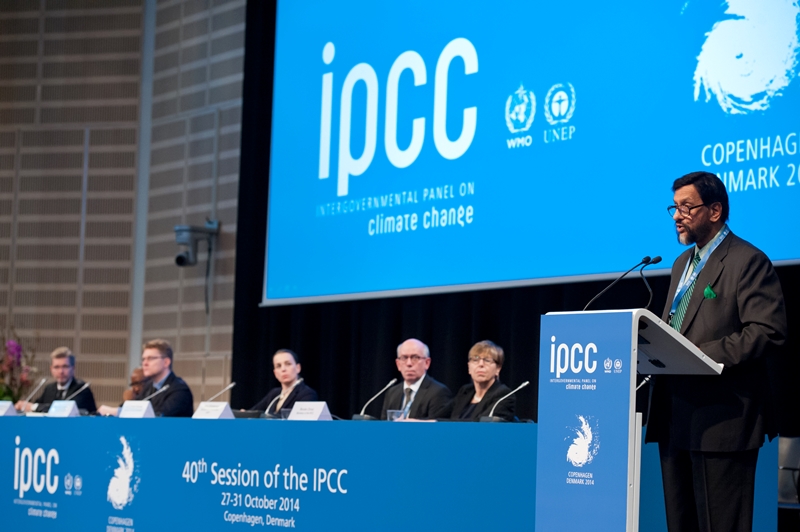
(Source : IPCC)
A. The IPCC conducts in-depth analyses of the latest research and climate data, presenting its finding in comprehensive reports.
1. Reporting on the Planet’s Health
The IPCC report gauges the planet’s health, predict future scenarios, and suggest measures to enhance its well-being.
During crises, the IPCC issues special reports, for example the Global Warming of 1.5°C, to address specific concerns.
All IPCC reports and data are accessible to scientists, policymakers, and the general public globally.
To learn more about the current state of our planet, Check out this article! ↓↓↓ |
2. Predicting future climate scenarios
IPCC scientists craft “climate projections” that explore various future scenarios for the planet. These projections consider different scenarios of what may happen to our planet.
Collaborating with international organizations like the United Nations Framework Convention on Climate Change (UNFCCC) the IPCC ensures the sharing of information and the development of global response strategies.
3. Warning messages for everyone
Functioning as a “planetary SOS message,” the IPCC issues urgent alerts it it determines that the Earth is in critical condition. These warnings prompt swift action from individuals and organizations worldwide.
―
IPCC’s AR6 Synthesis Report
The Most Important Report on Global Health
―
The IPCC’s 6th Assessment Report (AR6), published in 2021, stands as the most pivotal assessment of the planet’s health. It delivers a stark warning that the Earth’s temperature is escalating rapidly, signaling a critical state.
“Code Red for Humanity”
UN Secretary-General António Guterres declared a “Code Red for Humanity” upon the release of the IPCC’s 6th Assessment Report. Should the high-temperature scenarios outlined in the report materialize, Earth might become uninhabitable.
Here are the key takeaways from the 6th Assessment Report.
1. Human Activity as the Main Driver: The report unequivocally attributes climate change to human activity, emphasizing the urgency for an immediate response.
2. Critical Importance of the 1.5°C Target: A stern warning is sounded against exceeding a 1.5°C increase in global temperature from pre-industrial levels, as it would have serious repercussions for ecosystems and human society.
3. Tipping Point Emphasis: The report highlights the potential for irreversible climate change if temperatures surpass a certain threshold.
4. Rise in Extreme Weather Events: A more frequent and intense occurrence of extreme weather events is anticipated, including heatwaves, floods, and typhoons.
For a deeper understanding of human impact on the planet, Check out this article! ↓↓↓ |
<Contents of the IPCC’s 6th Assessment Report>
1. The Physical Science Basis
Describes the causes, current status, and future projections of global warming.
2. Impacts, Adaptation, and Vulnerability
Analyzes the impacts of climate change on humans and the natural environment.
3. Mitigation of Climate Change
Offers suggestions on how to mitigate the effects of climate change.
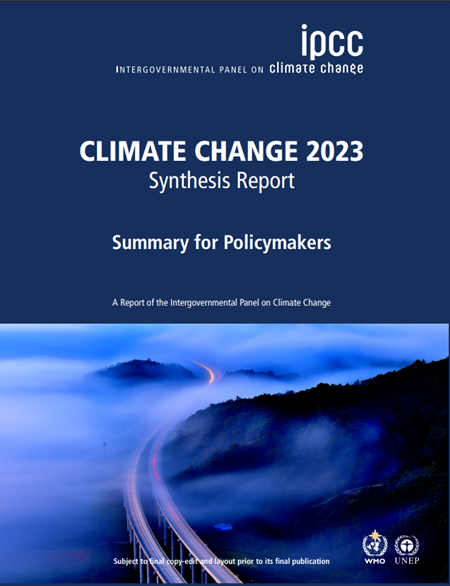
Link : IPCC’s 6th Assessment Report
―
IPCC’s Climate Scenarios, “Our House Is On Fire”
―
Climate scenarios are vital models predicting future climate changes to enable adequate preparation. The IPCC’s scenarios, particularly the highest temperature scenario, have raised concerns among experts and public figures.
Notably, environmentalist Greta Thunberg starkly warned that “our house is on fire,” emphasizing the urgency of addressing these climate scenarios.
Let’s take a look at some of the climate scenarios and projections.
<Major IPCC Climate Scenarios and Temperature Projections >
1. RCP Scenario (Representative Concentration Pathways)
Presented in the IPCC 5th Assessment Report (2013), it outlines greenhouse gas concentrations’ pathway based on Earth’s radiative forcing in 2100. Temperature projections by 2100 range from 1.3°C(RCP2.6) ~ 4°C(RCP8.5).
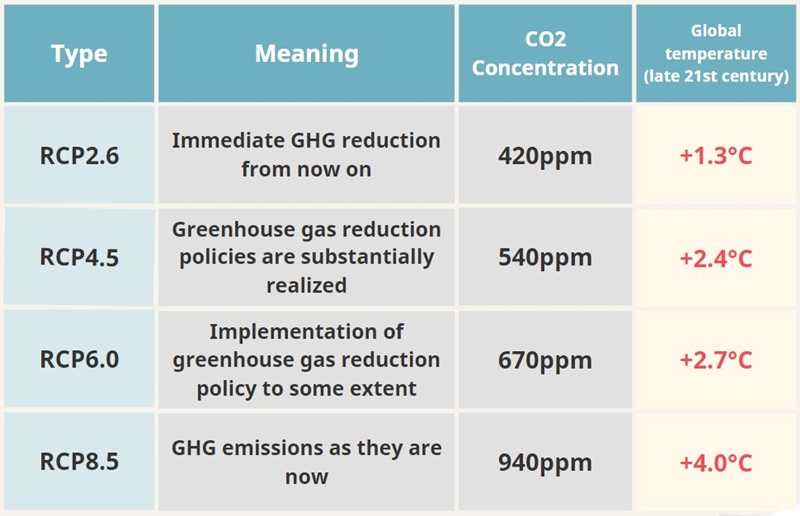
(Source : KMA)
2. SSP Scenario (Shared Socioeconomic Pathways)
Recently, there has been a growing reference to the SSP scenario, presented in the IPCC’s 6th Assessment Report (2021). This scenario incorporates global radiative forcing and envisions changes in future socioeconomic systems, including population, economy, and energy use by 2100.
This scenario predicts a temperature increase ranging from 1.9°C(SSP 1-2.6) ~ 5.1°C(SSP 5-8.5).
· SSP1-1.9: In this scenario, the temperature rises by 1.9°C or less by 2100, aligning with the goals of the Paris Agreement.
If realized, positive outcomes are expected, including limited sea level rise, mitigation of extreme weather events, biodiversity protection, and enhanced agriculture and food security.
· SSP2-4.5 and SSP3-7.0: These scenarios anticipate moderate levels of greenhouse gas emissions, reflecting a more realistic outcome if existing policies and behaviors remain largely unchanged.
· SSP5-8.5: This scenario envisions a temperature increase of 4.0°C~6.0°C by 2100, often considered a worst-case scenario. Experts view this as the most pessimistic projection, posing severe threats to humanity.
If a “high temperature scenario” like RCP 8.5 or SSP5-8.5 were to become a reality, humanity’s survival would be jeopardized by rising sea levels, severe environmental degradation, and food shortages.
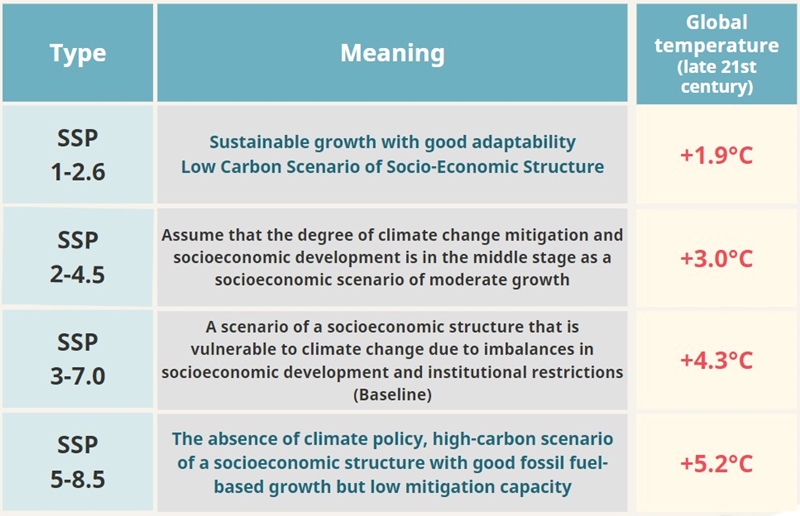
(Source : KMA)
―
Urgent Action in Need to Save the Planet
―
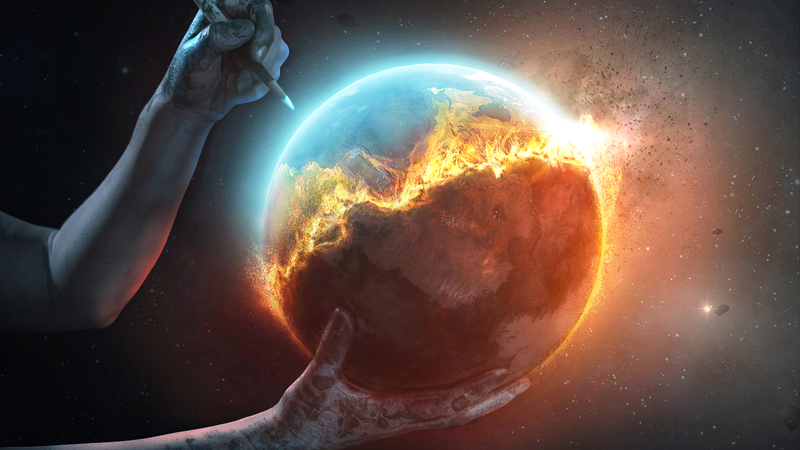
The IPCC’s report acts as a global warning siren, demanding immediate action. Much like a siren calls for swift response, the IPCC report serves as a call to cation for the planet.
Warnings such as UN Secretary-General António Guterres’ “Red Code for Humanity” and Greta Thunberg’s “Our house is on fire” emphasize the urgency for all of us to take climate action.
It’s time for each of us to contribute to climate action.
“To embrace the future,
we must expand the scope of vocations that can herald the coming of peace.
Even though we may never meet our descendants, we must make sure that all their activities will harmonize in peaceful societies and nations.”
-Dr. Hak Ja Han Moon
Founder of Sunhak Peace Prize-
Learn more: What are Planetary Boundaries? |
Written by Sharon Choi
Director of Planning
Sunhak Peace Prize Secretariat

